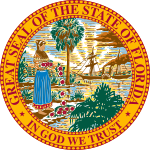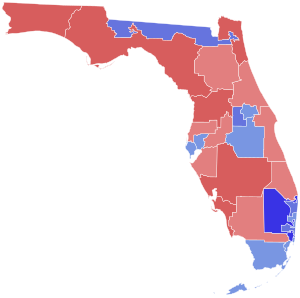
Back Pemilihan umum Senat Amerika Serikat di Florida 2018 ID 2018 United States Senate election in Florida SIMPLE
| |||||||||||||||||
| Turnout | 52.0% | ||||||||||||||||
|---|---|---|---|---|---|---|---|---|---|---|---|---|---|---|---|---|---|
| |||||||||||||||||
Scott: 50–60% 60–70% 70–80% 80–90% >90% Nelson: 50–60% 60–70% 70–80% 80–90% >90% Tie: 50% No data | |||||||||||||||||
| |||||||||||||||||
| Elections in Florida |
|---|
 |
|
|
The 2018 United States Senate election in Florida was held on November 6, 2018, alongside a gubernatorial election, elections to the U.S. House of Representatives and other state and local elections. Incumbent Democratic senator Bill Nelson ran for re-election to a fourth term, but was narrowly defeated by Republican governor Rick Scott. The election was the closest Senate race in the state's history.[2]
This was one of ten Democratic-held Senate seats up for election in a state won by Donald Trump in the 2016 presidential election. The results of the race were in dispute for 12 days following the election. The results showed that Nelson was narrowly trailing Scott, but the margin remained below 0.5%, triggering an automatic recount under Florida law. A controversial recount ensued, with both campaigns claiming irregularities. Following the recount, Florida elections officials confirmed Scott's victory on November 18, 2018. Scott received 50.05% of the vote, while Nelson received 49.93%; the margin of victory was 10,033 votes out of 8.19 million votes cast, or 0.12%. Both in terms of raw vote margin and by percentage of difference, this was the closest Senate election in the 2018 cycle. Scott's victory marked the first time since the Reconstruction era in 1875 that Republicans have held both Senate seats in Florida, making it the last former Confederate State to do so.[3]
- ^ Schneider, Mike (April 23, 2019). "Florida voter turnout in 2018 buoyed by youth, Hispanics". Associated Press. Retrieved May 29, 2020.
- ^ What you should know about the closest U.S. Senate race in Florida history, FloridaPolitics, November 26, 2018
- ^ "Florida to have 2 Republican senators for the first time since the Reconstruction era". 10NEWS. November 18, 2018. Retrieved June 25, 2019.




